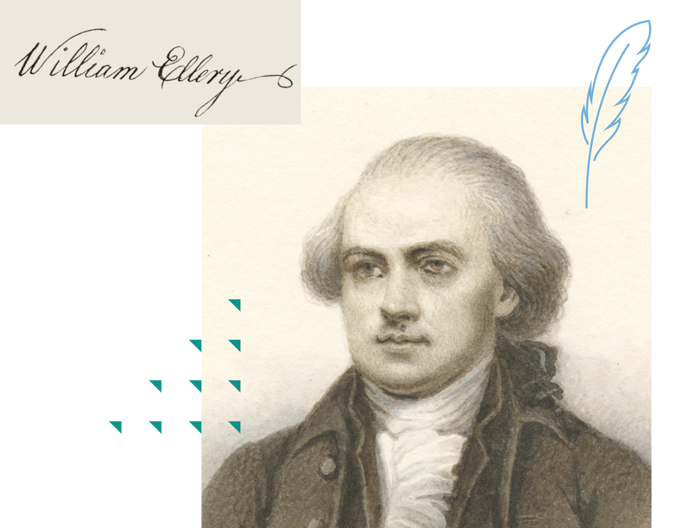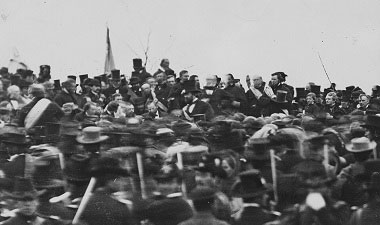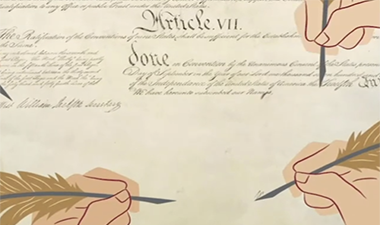Summary
William Ellery was in the mercantile business, and he opposed British policy toward the colonies. Ellery signed the Declaration and remained in Congress until 1785.
William Ellery | Signers of the Declaration of Independence
2:23
Biography
William Ellery was born in Newport, the son of William and Elizabeth Almy Ellery. As the oldest son of a wealthy merchant, William would inherit a major portion of his father’s estate. Like so many of the colonies’ elites, William began his education at home, tutored by his father, but at 16, he was a student at Harvard. When he graduated in 1747, he went into the family’s mercantile business.
William’s public service began in 1750 when he was appointed Clerk of the Court. In this role he learned much about the practice of law and the writing of writs and deeds, and the experience led him to pursue a career as a lawyer. He passed the bar in 1770 and began his practice.
As early as 1765, Ellery had become an active opponent of British policy toward the colonies. He helped lead a riotous march of Rhode Islanders through Providence to demonstrate local resistance to the Stamp Act. When Parliament passed the Intolerable or Coercive Acts, designed to punish Massachusetts for the Boston Tea Party, Ellery expressed his opposition to the Crown’s interference in colonial affairs. But it was the fighting at Lexington and Concord that convinced him that no accommodations should be sought with Britain. He urged the Continental Congress to “exert yourself.” He felt it was debasing to be ruled by Crown supporters when they could be ruled by Sons of Liberty. “There is liberty and fire enough,” he declared, “it only requires the application of the bellows. Blow then, a blast that will shake this country.”
During the 1770s, Ellery hoped to fill any vacancy in the Rhode Island delegation to the Congress that might occur. He got his wish in early 1776 when Samuel Ward became too ill to continue to serve. Ellery presented his credential to the Second Continental Congress in May, just as the debate over independence was beginning. He voted for Richard Henry Lee’s resolution that the colonies were and ought to be independent on July 2. On July 10, he wrote to his brother Benjamin that “We have lived to see a Period which a few years ago no human forecast could have imagined—to see these Colonies shake off and declare themselves independent of a State which they once gloried to call Parent….” Ten days later, still proud of Congress for its radical action, he wrote to Rev. Ezra Stiles, President of Yale College, saying that Americans would accept no accommodations Britain might offer to preserve the union of colonies and Mother Country. “[T]he door is shut,” he said; “We have been driven into a Declaration of Independency & must forget our former love of our British brethren. The Sword must determine our quarrel.”
On August 2 William Ellery joined other members of Congress in signing the Declaration of Independence penned by Thomas Jefferson. Ellery recognized the historic nature of the day. “I was determined to see how they all looked as they signed what might be their death warrant, I place myself beside the Secretary Charles Thomson and eyed each closely as he affixed each name to the document.” He was proud to note that “Undaunted resolution was displayed in every countenance.”
Ellery remained in Congress until 1785, serving through the adoption of the Articles of Confederation and until the movement for a reassessment of the Articles would lead to the Philadelphia convention that drafted the Constitution. He did so at great cost to his financial resources. To save money, he rode on horseback from Rhode Island to the sessions of Congress rather than traveling in the relative comfort of a carriage. He was keenly aware that few people along his route would take him for a political leader of the country. As a short and slightly built man, he readily acknowledged that he was not an impressive figure. “Had I announced myself as a member of Congress, who would have believed me? Setting aside my spectacles, there is, I am sure, no dignity in my person or appearance.”
Although those who knew Ellery admired him as an interesting and well- informed speaker, an entertaining correspondent, and an equally entertaining conversationalist, Ellery never boasted of his social skills or of his career accomplishments. Late in life he summed up his career with typical modesty and gentle humor: “I have been a clerk of the court, a quack lawyer, a member of Congress, one of the lords of the Admiralty, a judge, a loan officer, and finally a Collector of the customs and thus, not without great difficulty, but as honestly, thank God, as most men, I have got through the journey of a varied and sometimes anxious life.” That life was not only varied, it was long: William Ellery died in 1820, one of only three Signers to live into his 90s.








